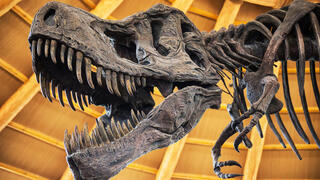Fewer Tyrannosaurus rex fossils are available for scientific research as wealthy collectors continue to purchase them for private collections, according to a new study published in Palaeontologia Electronica. The trend reflects a growing market for dinosaur fossils, with near-complete skeletons fetching tens of millions of dollars at auctions. But the private trade in T.
rex specimens is now hindering scientific efforts to study the iconic Cretaceous predator, which roamed Earth for roughly 80 million years—from 145 million to 66 million years ago. T-Rex sold in Switzerland for about $6 million ( Video: Reuters ) Professor Thomas Carr of Carthage College, who heads the Carthage Institute of Paleontology in Wisconsin, found that more scientifically valuable T. rex specimens are currently held by private owners or commercial entities than by public museums or other research institutions.

Carr told Live Science that the situation is both troubling and frustrating. “Research into the early growth stages of the T. rex is lacking because those fossils are held in private or commercial hands—this has taken the heaviest scientific toll,” he said.
To better understand the private market's impact on available fossil material, Carr focused his study on what he describes as “scientifically informative” specimens—skulls, skeletons, and individual bones that could shed light on the T. rex’s developmental stages. His broad survey identified 61 specimens in public collections, compared to 71 held privately, including 14 juvenile specimens.
Carr noted that additional privately held fossils may still surface in the coming years. Although commercial specimens sometimes reach public institutions through purchases or long-term loans, Carr found that only about 11% of T. rex fossils end up in public hands.
In fact, commercial fossil hunters discover twice as many T. rex remains as museum teams do. Get the Ynetnews app on your smartphone: Google Play : https://bit.
ly/4eJ37pE | Apple App Store : https://bit.ly/3ZL7iNv Carr also pointed out that the trade in high-value dinosaur fossils is not limited to T. rex.
The fossil market includes many species, and the most expensive dinosaur ever sold was a Stegosaurus, which fetched $44.6 million at a 2024 auction. That specimen is now on loan to the American Museum of Natural History in New York.
Carr hopes his study will encourage other researchers to examine how the commercial fossil market affects access to other prehistoric species, just as he did with the T. rex. Still, paleontologist Dr.
David Hone of Queen Mary University of London told Live Science that while he would prefer to see more fossils in public collections, he isn’t overly concerned about the T. rex trade specifically. “There’s almost nothing that can be done about the private fossil market,” Hone said.
“I’d like to see more specimens go to public institutions, but I’m more concerned about rare and important fossils—like those from Brazil and Mongolia—that are being traded illegally.” >.
Environment

Fossil sales by world's rich are undermining scientific research, study finds

Growing number of Tyrannosaurus Rex fossils are ending up in private hands, limiting access for researchers and stalling scientific study of the iconic predator’s growth and evolution, a new study warns















